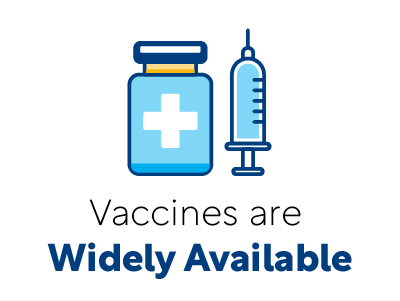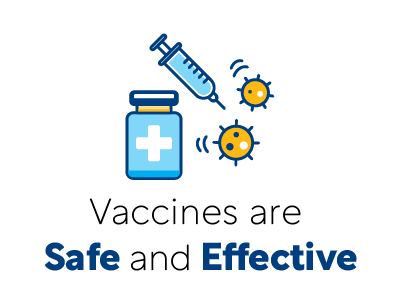COVID-19 Vaccines
COVID-19 vaccination (primary and boosters):
To determine which vaccine or booster you should receive, please visit the CDC Vaccines for COVID-19 website.
From December 2020 - December 2022, SHP Medical Services administered over 8,000 doses
of COVID-19 vaccines. Due to low demand, we are no longer offering COVID-19 vaccine
clinics and instead refer students and staff to vaccine sites in the community. Please
visit vaccines.gov to find a vaccination site near you.
last updated 10-25-23
Vaccine Safety
COVID-19 vaccines are effective, and their safety is closely monitored by the Centers for Disease Control and Prevention and Food and Drug Administration. The CDC recommends that people get a vaccine as soon as they are eligible and able.
Between Dec. 14, 2020, and mid-May, more than 272 million doses of COVID-19 vaccine have been administered in the U.S. The vaccines were evaluated in tens of thousands of participants in clinical trials and met the FDA's rigorous, scientific standards for safety, effectiveness and manufacturing quality so that they could be granted emergency use authorization.
COVID-19 vaccines have undergone and will continue to undergo the most intensive safety monitoring in U.S. history. This monitoring includes using both established and new safety monitoring systems to make sure that COVID-19 vaccines are safe.
CDC, FDA, and other federal agencies will continue to monitor the safety of COVID-19 vaccines as they continue to become more broadly used in the population.
Looking for flu vaccine information?
Student Health Partners offers vaccinations for influenza by appointment and at periodic walk-up clinics. More information on flu shots is available on the Medical Services website.
Frequently Asked Questions
Whether MSU offers the Moderna, Pfizer, Johnson & Johnson. or Novavax COVID-19 vaccines (and others as they become available) depends on the available supply and what Student Health Partners keeps in stock. Student Health Partners will specify which company’s vaccine will be offered when it communicates about availability.
CDC and the FDA continue to update guidance on how many vaccinations individuals should receive. For the latest advice, please review this CDC website: COVID-19 Vaccines for Specific Groups of People.
MSU is currently offering doses of federally-supported COVID vaccines to its eligible students and employees free of cost.
Common side effects from the COVID-19 vaccines are similar to flu vaccines you may have received in the past. They include pain and swelling at the injection site. People can also experience flu-like symptoms — fever, chills, fatigue and headache — for a few days after receiving a shot.
Should redness or tenderness at the injection site worsen after 24 hours, or if the side effects are worrying you and do not seem to be going away after a few days, consult a doctor.
Some individuals have experienced a severe allergic reaction to vaccinations. If you get a COVID-19 vaccine and think you are having a severe allergic reaction after leaving the vaccination site, seek immediate medical care by calling 911. Learn more about COVID-19 vaccines and rare severe allergic reactions.
Anyone who is allergic to the ingredients in the vaccines should not get vaccinated. Also, if you have any allergic reaction to the first dose, you should discuss with your medical provider before receiving a second dose. The following PDF fact sheets include lists of ingredients in each company’s vaccine.
Yes. The CDC recommends that people get vaccinated whether they had had COVID-19 or not. You may receive a vaccination as soon as you complete isolation for your COVID-19 infection.
Scientists aren't sure yet how long you're protected from getting sick again after recovering from COVID-19. This natural immunity after being sick varies from person to person.
It's rare for someone who has had COVID-19 to get reinfected, and it's uncommon for people to get the disease again with 90 days of recovering, but the science isn't certain yet.
The CDC notes, however, that if you were treated for COVID-19 symptoms with monoclonal antibodies or convalescent plasma, you should wait 90 days before getting a COVID-19 vaccine. Talk to your doctor if you are unsure what treatments you received or if you have more questions about getting a COVID-19 vaccine.
Following guidelines set forth by the Montana Office of the Commissioner of Higher Education, MSU is not requiring students to be vaccinated for COVID-19, and we are not asking for COVID-19 vaccination records. MSU campus life should be the same for students regardless of their vaccination status. Precautions such as masks and social distancing will be voluntary.
That said, we strongly recommend that all students and members of the campus community get the vaccine while it is free and widely available.
Student vaccination requirements are decided by the Montana Board of Regents, which is the governing body of the state's university system. The board has not adopted a policy requring COVID-19 vaccinations, as it has for other immunizations. Students need to follow all immunization requirements set by the Regents. For questions concerning Board of Regents policies, contact the Office of the Commissioner of Higher Education.
No. You will not test positive on a viral test, such as a nasal swab test, that looks for signs of infection. However, you may test positive on an antibody test. That’s because vaccines teach your body to make its own antibodies to fight viruses.
According to the CDC, people who are pregnant and part of a group recommended to get a vaccine may choose to do so. While the chances of severe health effects from COVID-19 are low, people who are pregnant do have an increased risk of severe illness from COVID-19 or adverse pregnancy outcomes.
Breastfeeding is an important consideration but is rarely a safety concern with vaccines, and there is no scientific data to suggest the COVID-19 vaccines are unsafe for those who are breastfeeding.
See more vaccine considerations for people who are pregnant or breastfeeding.
No. The vaccines do not contain infectious material.
Sometimes people get a fever or feel tired for a day or so after getting a vaccine. These symptoms are normal and are a sign that the body is building immunity. It usually takes a few weeks for the body to build immunity after vaccination.
In addition to vaccines being widely available through the Gallatin City-County Health Department, Bozeman Health and other providers, MSU faculty and staff at MSU can sign up for free vaccine clinics offered periodically in the SUB.
Information about the COVID-19 vaccines is published by the Centers for Disease Control and Prevention on its website. Links to those informational pages are below.
- Number of COVID-19 Vaccinations in the United States
- Eight Things to Know about the U.S. COVID-19 Vaccination Program
- When Vaccine Supply is Limited, Who Gets Vaccinated First?
- What to Expect at Your COVID-19 Vaccination Visit
- Benefits of Getting a COVID-19 Vaccine
- Rare Severe Allergic Reactions
- Different COVID-19 Vaccines
- Ensuring Safety of COVID-19 Vaccines
- Ensuring COVID-19 Vaccines Work
- Frequently Asked Questions about COVID-19 Vaccinations
Additional information and the answers to many frequently asked questions about the available COVID-19 vaccines are listed on the Gallatin City-County Health Department vaccine information page.
Other questions dealing with your unique health situation should be directed to your health care provider. If you are a student, you can contact the Medical Services division of Student Health Partners by calling 406-994-2311.
Additional Information from the CDC
- Number COVID-19 Vaccinations in the United States
- Eight Things to Know about the U.S. COVID-19 Vaccination Program
- When Vaccine Supply is Limited, Who Gets Vaccinated First?
- What to Expect at Your COVID-19 Vaccination Visit
- Benefits of Getting a COVID-19 Vaccine
- Rare Severe Allergic Reactions
- Different COVID-19 Vaccines
- Ensuring Safety of COVID-19 Vaccines
- Ensuring COVID-19 Vaccines Work
- Frequently Asked Questions about COVID-19 Vaccinations
Additional information and the answers to many frequently asked questions about the available COVID-19 vaccines are listed on the Gallatin City-County Health Department vaccine information page.
Updated: 7/19/22



